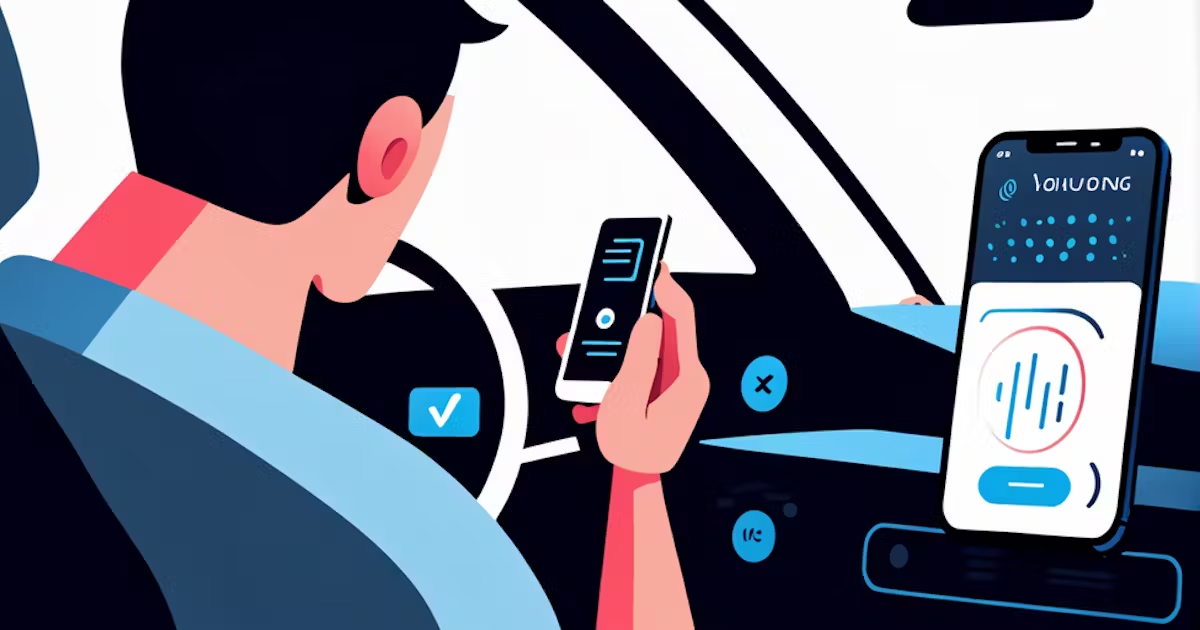Voice technology has quickly become one of the most transformative trends in the mobile app industry. What was once a futuristic concept is now a daily reality, as voice-activated virtual assistants like Siri, Google Assistant, and Alexa are being integrated into more aspects of our lives. With advancements in natural language processing (NLP) and machine learning (ML), voice technology in mobile apps is not only enhancing user experiences but also reshaping how we interact with our devices.
In this blog, we will explore the rise of voice technology, how it’s transforming mobile apps, and why it represents the next frontier for app development.
The Rise of Voice Technology
Voice technology has evolved rapidly in recent years. While early voice recognition systems were often unreliable and limited in their capabilities, the landscape has changed dramatically with advancements in AI-powered speech recognition. Major tech companies like Apple, Google, Amazon, and Microsoft have invested heavily in voice technology, making it an integral part of the mobile ecosystem.
Key Developments Driving Voice Technology:
Natural Language Processing (NLP): NLP has improved dramatically, allowing voice assistants to understand context, intent, and even nuanced language. This makes voice interactions more natural and user-friendly.
Machine Learning and AI: Voice recognition systems now leverage machine learning algorithms to improve accuracy over time. These systems learn from users’ speech patterns, accents, and commands, making them more reliable.
Voice Biometrics: Security and authentication are crucial in the digital world. Voice biometrics allows apps to recognize and authenticate users based on their unique voiceprint, providing a secure and convenient method for logging into apps and completing tasks.
5G Connectivity: The rollout of 5G networks ensures that voice-activated systems can process commands more quickly and reliably. Low latency and faster speeds will drive real-time interactions between users and their mobile apps.
Why Voice Technology Matters for Mobile Apps

Voice technology is not just a cool feature—it’s a revolution in how users interact with apps. It represents a paradigm shift from touchscreens and manual inputs to hands-free, conversational interfaces that offer greater convenience and accessibility.
1. Enhanced User Experience
Voice technology can streamline the way users interact with apps by offering faster, hands-free navigation. For instance, instead of typing in a search query or scrolling through options, users can simply ask, “What’s the weather like today?” or “Find the nearest restaurant.” This frictionless experience saves time and effort, enhancing overall user satisfaction.
2. Accessibility
Voice interfaces are a game-changer for accessibility. They enable individuals with visual impairments, motor disabilities, or literacy challenges to use mobile apps in ways that weren’t possible before. By allowing users to interact with apps through speech rather than touch or text, developers can create more inclusive applications.
3. Personalization
Voice technology can make app experiences more personalized and intuitive. Since voice assistants can recognize individual voices, they can tailor responses to specific users. For example, a smart home app can recognize family members’ voices and adjust settings based on their preferences—turning on specific lights, adjusting the thermostat, or playing personalized playlists.
4. Hands-Free Operation
One of the most obvious benefits of voice technology is its hands-free nature. Whether driving, cooking, or exercising, users can interact with apps without needing to touch their phones. This capability opens up new possibilities for app use in various environments, increasing engagement and usability.
5. Faster Input and Multitasking
Typing on small mobile screens can be cumbersome, but voice commands allow for much faster input. By speaking instead of typing, users can accomplish tasks in a fraction of the time. Additionally, voice commands allow for multitasking, enabling users to operate apps while doing other things.
Use Cases for Voice Technology in Mobile Apps

Voice technology can be applied across a wide range of mobile apps, transforming various industries and experiences. Let’s take a look at some of the top use cases where voice technology is making a significant impact.
1. Voice Assistants and Smart Homes
Voice-controlled virtual assistants like Amazon Alexa and Google Assistant have already revolutionized the smart home ecosystem. Mobile apps that integrate with smart devices allow users to control their homes entirely through voice commands. Users can adjust lighting, control thermostats, lock doors, and even control entertainment systems with a simple voice command, offering unmatched convenience.
2. Healthcare
In healthcare apps, voice technology can facilitate easier access to medical information, appointment scheduling, and even remote patient monitoring. Patients can ask apps questions about their symptoms, medications, or treatment plans, and healthcare professionals can document patient information using voice dictation.
Voice-enabled healthcare apps can also be beneficial for elderly or disabled individuals who may struggle with traditional touch interfaces, allowing them to interact with apps more easily.
3. E-Commerce
Voice commerce, or v-commerce, is an emerging trend in the retail industry. Shopping apps with voice capabilities allow users to search for products, check prices, and complete transactions using their voice. For example, a user could say, “Order a new pair of shoes,” or “Add shampoo to my cart,” speeding up the shopping process and eliminating the need for manual searches.
4. Navigation and Travel
Voice technology is transforming navigation and travel apps. Users can now ask apps for directions, traffic updates, or travel recommendations while driving or walking. Instead of typing in locations or searching for travel options, users can simply ask, “How do I get to the nearest gas station?” or “Book a flight to New York.” This hands-free experience enhances safety, convenience, and efficiency for travelers.
5. Entertainment and Media
Entertainment apps such as music streaming services, video platforms, and news apps are embracing voice technology. Users can now control playback, search for media content, or even ask for personalized recommendations. Commands like “Play my workout playlist” or “Skip to the next episode” are becoming commonplace, allowing users to interact with content more naturally.
6. Banking and Finance
Voice technology in banking apps is enabling users to check their account balances, make payments, and even receive financial advice through voice commands. Users can ask, “What’s my current balance?” or “Transfer $50 to my savings account,” simplifying complex transactions and improving the overall user experience.
7. Fitness and Wellness
Fitness apps are integrating voice technology to assist users in real-time. Whether it’s providing workout instructions, monitoring health metrics, or offering encouragement during a run, voice commands make it easier to track fitness goals without stopping to interact with the screen.


Challenges of Implementing Voice Technology in Mobile Apps
While voice technology presents exciting opportunities, there are several challenges that developers must consider when implementing it in mobile apps:
1. Accurate Voice Recognition
Ensuring accurate voice recognition across different accents, languages, and speech patterns can be challenging. Developers must build systems that are robust and can understand users even in noisy environments or when they speak quickly.
2. Security Concerns
As voice technology evolves, privacy and security concerns are becoming more prominent. Voice authentication and biometrics can improve security, but developers must ensure that voice data is stored and processed securely, adhering to data protection regulations like GDPR.
3. Natural Language Processing (NLP) Limitations
Despite advancements, NLP still struggles with understanding complex queries or ambiguous language. Developers need to continuously improve the ability of voice systems to interpret context, intent, and tone to ensure accurate responses.
4. User Adoption
Although voice technology is growing rapidly, not all users are comfortable using voice commands. Some may find it awkward or unreliable. Therefore, apps should offer traditional input methods alongside voice commands to ensure broad usability.
Best Practices for Integrating Voice Technology in Mobile Apps

If you’re considering incorporating voice technology into your mobile app, here are some best practices to ensure a smooth and user-friendly experience:
1. Keep It Simple
- Start with simple, common commands that can be easily understood and used. Overcomplicating voice interactions can lead to confusion and errors.
2. Offer Visual Feedback
- When users interact with the app via voice, provide visual confirmation or feedback that their command was understood and is being processed. This helps users trust the system and stay engaged.
3. Optimize for Context
- Ensure that your app understands the context of voice commands. For instance, if a user says, “Turn on the lights,” your app should know which room’s lights to control, based on their location or previous interactions.
4. Provide Alternatives
- Not every user will want to use voice commands all the time. Make sure your app provides alternative methods of interaction, such as touch or text input, to accommodate all user preferences.
5. Prioritize Privacy and Security
- Ensure that voice data is handled securely. If your app uses voice for sensitive transactions, implement strong authentication methods and ensure that users’ voice data is encrypted and not misused.
Conclusion
Voice technology is transforming the mobile app landscape, offering more intuitive, accessible, and efficient ways for users to interact with their devices. From voice-activated virtual assistants to voice-controlled smart home apps, the integration of voice technology is rapidly becoming a necessity rather than a novelty.
As the technology continues to advance, voice interfaces will play a pivotal role in shaping the future of mobile app development. By embracing this trend, app developers can create more engaging, accessible, and personalized user experiences, positioning themselves at the forefront of innovation in the mobile industry.
The next frontier of mobile app development is voice-driven. The question is, will your app be ready?
Tips for Reducing App Load Time and Memory Usage
- October 17, 2024
- Com 0
In today’s fast-paced digital world, users expect mobile apps to perform flawlessly, load quickly, and run efficiently. An app that…
Strategies to Reduce App Abandonment and Increase Retention
- October 17, 2024
- Com 0
In the highly competitive app marketplace, user retention is one of the most important metrics for measuring success. While acquiring…
Fintech App Development: Ensuring Compliance and Security
- October 16, 2024
- Com 0
The rapid growth of fintech (financial technology) apps has revolutionized the financial services industry. From mobile banking and digital wallets…
The Future of Mobile Apps in the Travel and Tourism Industry
- October 15, 2024
- Com 0
The travel and tourism industry has undergone a significant transformation in recent years, driven largely by advancements in technology. Mobile…
What Every Developer Should Know About Securing API Endpoints
- October 13, 2024
- Com 0
APIs (Application Programming Interfaces) play a critical role in modern application development, enabling communication between client applications and backend services.…
Integrating Cloud Services into Your Mobile App
- October 12, 2024
- Com 0
Cloud services have revolutionized the way modern mobile apps are developed, deployed, and maintained. Integrating cloud services into your mobile…







